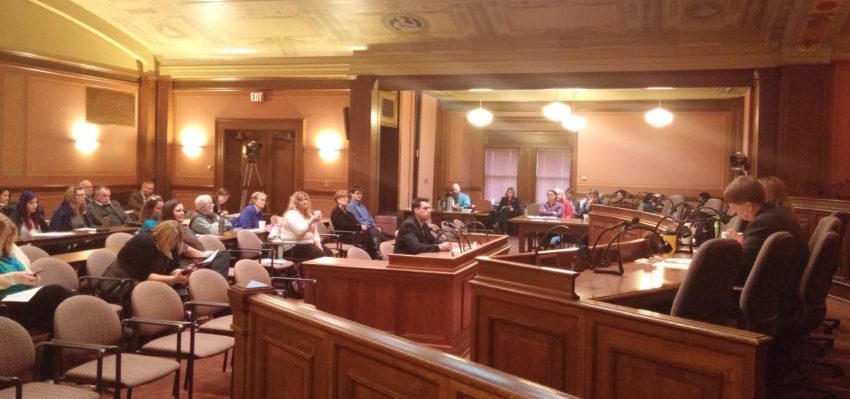 [bctt tweet=”In 2011-12, 13.7% of WI teachers had been threatened with violence from students in the previous year, and 11.3% of teachers had been physically assaulted. A bill by Rep. Jeremy @Thiesfeldt seeks to change that. #wiright #wipolitics” username=”MacIverWisc”]
[bctt tweet=”In 2011-12, 13.7% of WI teachers had been threatened with violence from students in the previous year, and 11.3% of teachers had been physically assaulted. A bill by Rep. Jeremy @Thiesfeldt seeks to change that. #wiright #wipolitics” username=”MacIverWisc”]
MacIver News Service | January 12, 2018
By Abby Streu
MADISON, Wis. – Students are beating up their teachers in class without facing any repercussions, some Wisconsin lawmakers assert, and they are working on a law to fix it.
The Assembly Committee on the Judiciary held a public hearing Thursday for Assembly Bill 693 (AB 693). Rep. Jeremy Thiesfeldt (R-Fond du Lac) authored the bill, also known as the Teacher Protection Act.
“What truly grows the ‘school-to-prison pipeline’ is the current trend towards minimizing serious negative behavior and coddling children with no serious consequences,” said Rep. Jeremy Thiesfeldt.
Right now, when students act out violently in class, school districts tend to ignore the problem and the victims, according to Thiesfeldt and others who support the legislation. He wants teachers to be able to take matters into their own hands.
If passed, teachers would have more avenues to protect themselves and seek more information, including being able to receive leave or terminate their contract without penalty if assaulted in the workplace, and receiving information about students who have been taken into custody for a felony or violent misdemeanor.
Teachers would also be able to remove a student from their classroom for two consecutive days – known as a “cool-down period” – without suspending the student.
Rep. Thiesfeldt cited a federal Department of Education report, showing that in the 2011-12 school term, 13.7 percent of Wisconsin teachers had been threatened with violence from students in the previous year, and 11.3 percent of teachers had been physically assaulted.
“What truly grows the ‘school-to-prison pipeline’ is the current trend towards minimizing serious negative behavior and coddling children with no serious consequences,” Thiesfeldt said.
Rep. Chris Taylor (D-Madison) strongly opposed the protections for teachers, claiming they would unfairly target minority and disabled children.
Supporters of the bill pointed out that AB 693 intends to focus on the violence committed against teachers in inner-city schools, rather than singling out students who have little control over their actions as a result of disabilities.
Radio talk show host Dan O’Donnell from WISN in Milwaukee produced the special investigative report, “Blood on the Blackboard” on June 3, 2016—an exposé about increasing violence against teachers in the public school system. In his testimony to the committee, he shared accounts of school staff members who have been assaulted by students. A student choked a school security officer with his lanyard; all while the school’s principal was cancelling a 911 call. A pregnant eighth grader assaulted another teacher.
O’Donnell praised the bill, stating, “We have a system in which teachers do not feel they are being heard.”
Officer Mark Buetow, Vice President of the Milwaukee Police Association, also spoke in favor of the bill. Officer Buetow explained the “mechanics” of how Milwaukee officers currently interact with Milwaukee Public Schools.
Officer Buetow stated that the Milwaukee police force has a group of officers designated for public schools who know what to report, informally calling them the “school squad.” When a significant crime is committed by a student, the “school squad” sends that information to the district. Buetow stressed that this legislation does not change how crimes are reported.
[bctt tweet=”“Teachers deserve the knowledge and power to determine safety for themselves and other students in classrooms,” said Officer Mark Buetow of the Milwaukee Police Association. #wiright #wipolitics ” username=”MacIverWisc”]Rep. Taylor questioned the practicality of reporting smaller crimes, such as jaywalking, to schools. Officer Buetow stated that his officers do not report those crimes, as they are not affecting classroom safety. The bill itself states that arrests would only be reported if the suspected crime were a felony or violent misdemeanor.
“Teachers deserve the knowledge and power to determine safety for themselves and other students in classrooms,” Buetow said.
Authors made clear that they were open to amendments to the legislation. An executive session is expected to be held soon.